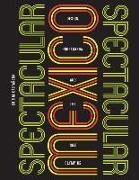Read more
Klappentext " In the wake of its early twentieth-century civil wars! Mexico strove to present itself to the world as unified and prosperous. The preparation in Mexico City for the 1968 Summer Olympics was arguably the most ambitious of a sequence of design projects that aimed to signal Mexico's arrival in the developed world. In Spectacular Mexico! Luis M. Castaaneda demonstrates how these projects were used to create a spectacle of social harmony and ultimately to guide the nation's capital into becoming the powerful megacity we know today. Not only the first Latin American country to host the Olympics! but also the first Spanish-speaking country! Mexico's architectural transformation was put on international display. From traveling exhibitions of indigenous archaeological artifacts to the construction of the Mexico City subway! Spectacular Mexico details how these key projects placed the nation on the stage of global capitalism and revamped its status as a modernized country. Surveying works of major architects such as Felix Candela! Pedro Ramairez Vazquez! Ricardo Legorreta! and graphic designer Lance Wyman! Castaaneda illustrates the use of architecture and design as instruments of propaganda and nation branding. Forming a kind of "image economy!" Mexico's architectural projects and artifacts were at the heart of the nation's economic growth and cultivated a new mass audience at an international level. Through an examination of one of the most important cosmopolitan moments in Mexico's history! Spectacular Mexico positions architecture as central to the negotiation of social! economic! and political relations. "-- Zusammenfassung " In the wake of its early twentieth-century civil wars! Mexico strove to present itself to the world as unified and prosperous. The preparation in Mexico City for the 1968 Summer Olympics was arguably the most ambitious of a sequence of design projects that aimed to signal Mexico's arrival in the developed world. In Spectacular Mexico! Luis M. Castaaneda demonstrates how these projects were used to create a spectacle of social harmony and ultimately to guide the nation's capital into becoming the powerful megacity we know today. Not only the first Latin American country to host the Olympics! but also the first Spanish-speaking country! Mexico's architectural transformation was put on international display. From traveling exhibitions of indigenous archaeological artifacts to the construction of the Mexico City subway! Spectacular Mexico details how these key projects placed the nation on the stage of global capitalism and revamped its status as a modernized country. Surveying works of major architects such as Felix Candela! Pedro Ramairez Vazquez! Ricardo Legorreta! and graphic designer Lance Wyman! Castaaneda illustrates the use of architecture and design as instruments of propaganda and nation branding. Forming a kind of "image economy!" Mexico's architectural projects and artifacts were at the heart of the nation's economic growth and cultivated a new mass audience at an international level. Through an examination of one of the most important cosmopolitan moments in Mexico's history! Spectacular Mexico positions architecture as central to the negotiation of social! economic! and political relations. "-- ...

